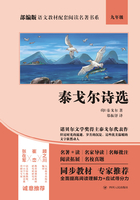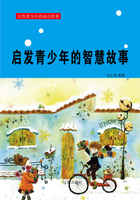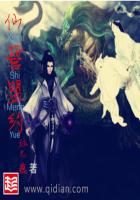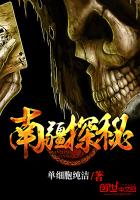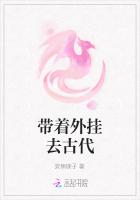It doesn’t interest me to know where you live or how much money you have. I want to know if you can get up after a night of grief and despair, weary and bruised to the bone, and do what needs to be done for the children.
It doesn’t interest me who you are, how you came to be here. I want to know if you will stand in the center of the fire with me and not shrink back.
It doesn’t interest me where or what or with whom you have studied. I want to know what sustains you from the inside when all else falls away. I want to know if you can be alone with yourself, and if you truly like the company you keep in the empty moments.
Vocabulary 词汇
Betrayal [bitrei?l] n. (被)背叛,出卖,泄密,引诱
ecstasy ["ekst?si] n. 狂喜,出神,入迷,陶醉
toe [t?u] n. 脚趾;足尖;
vt. 用脚尖走;
vi. 动脚尖;用足尖跳舞
accusation ["?kju:"zei??n] n. 控告,谴责
grief [ɡri:f] n. 悲伤,悲痛;悲伤的事,悲痛的缘由
shrink [?ri?k] vt. & vi. 收缩,退缩
Practice
Write yes if the sentence is true. Write no if the sentence is not true.
1.You shouldn’t risk looking like a fool for love, for your dreams, for the adventure of being alive.
2.You should opened by life’s betrayals.
3.To be careful, be realistic, to remember the limitations of being human.
4.You can’t disappoint another even if lie to yourself.
5.Where or what you have studied is very important.
译文
你以什么谋生我不感兴趣。我想知道的是你因什么而痛苦,想知道你是否敢于去梦想满足心灵的渴望。
你的年龄我不感兴趣。我想知道的是你是否甘当傻瓜去追求爱、追求梦想和经历生活的惊险刺激。
是什么磨圆了你的棱角我不感兴趣。我想知道的是你是否触碰过自己受伤的心,是否因为生活辜负过你而变得豁达,还是因为害怕遭受更多的痛苦而变得无助、紧闭心扉。
我想知道你是否能痛苦着我的痛苦而不是避开它,躲着它。
我想知道你是否能欢乐着我的欢乐,是否能狂舞一曲,让快乐溢满你的指尖和脚趾,而不是告诫我们:要小心翼翼、要现实、要牢记做人的局限。
你说的是真是假我不感兴趣。我想知道的是你是否为了忠实于自己而敢于令他人失望,是否敢于承担背叛的骂名而不愿违背良心,是否能做到诚实可靠从而值得信赖。
我想知道你是否能领略美,是否因为生命的存在而追溯生命的起源。我想知道你是否愿意接受你我的失败并仍然敢于站在湖边,对着银色的满月大声回答“是”。
你栖身何处、有多少金钱我不感兴趣。我想知道的是一夜伤心和绝望、一身疲惫和伤痕之后,你是否照样起床,履行应尽的义务,养育待哺的孩子。
你有何背景、何以成为现在的你我不感兴趣。我想知道的是你是否愿意与我一道,站在烈火中央而不退缩。
你在哪里受的教育,学的什么以及以谁为师我不感兴趣。我想知道的是一切消逝之后是什么在内心支撑着你,你是否能够独自面对自己,是否真正喜欢你在空虚时刻结交的伙伴。
练习
判断正误:
1.你不应该当傻瓜去追求爱、追求梦想和经历生活的惊险刺激。
2.当生活辜负你时,你要因此变得豁达。
3.要小心翼翼、要现实、要牢记做人的局限。
4.你不应该令他人失望,哪怕对自己撒谎。
5.你在哪里受的教育,学的什么非常重要。
1.no 2.yes 3.no 4.no 5.no
07 Avoid Being Stubborn 丢掉无谓的固执
There once were two poor woodsmen who made a living by collecting woods in the mountain. One day, they happened to discover two large bag of cotton in the mountain and felt surprisingly happy. The cotton was light but valuable, so they carried it on their back and went back home.
When they were walking home, one of the woodsmen spotted a large bundle of cloth beside the road. So he discussed with his partner whether to discard the cotton and take the cloth instead. But his partner held a different view that since he had carried the cotton for such a long way, he would not change it with cloth because all his previous effort would turn out to be in vain. Therefore, the other woodsman abandoned the cotton and carried the cloth on his back. After walking for a while, the woodsman who carried the cloth spotted several jars of gold disseminated on the ground not far away. He felt so thrilled that he was going to be a wealthy man. So he gave up the cloth and used his carrying pole to carry two jars of gold, while his partner was still reluctant to abandon the cotton and wondering whether the gold was real or not.
However, when they just went down to the foot of the mountain, it began to rain all of a sudden. Both of them were wet from head to toes. More unfortunately, the woodsman who carried the cotton found that his cotton had absorbed tons of water and became so heavy that he could no longer go on carrying it. Desperately, he had to abandon the cotton and went back home empty-handed with his partner carrying gold.
This story implies that we should deliberately utilize our wisdom and intelligence to make the right choice in face of every critical point in our life. Meantime, we should not forget to review all the choices we have carefully and adjust our goal accordingly. We should learn to view a certain issue from different angles and avoid being stubborn. By opening your mind to the right choice, you will be guided to a smoother way to success.
Vocabulary 词汇
discard [dis"kɑ:d] vt. 抛弃,不再使用;
n. 打出的牌,废弃的东西
vain [vein] adj. 徒劳的,虚荣的,空虚的
jar [d?ɑ:] n. 罐,广口瓶,震动,刺耳声
disseminate [di"semineit] vt. 散布,传播
reluctant [ril?kt?nt] adj. 不情愿的,勉强的
deliberately [dilib?ritli] adv. 慎重地,谨慎地,故意地,蓄意地
stubborn ["st?b?n] adj. 顽固的,固执的,难以移动的、难以去除的
Practice
Write the answer in the blank using the correct word or sentence.
1.Compared with woods, the cotton was light but .
2.The woodsman would not change gold with cloth because .
3.The woodsman had to abandon the cotton on account of .
4.We should learn to view a certain issue from different .
译文
有两个贫苦的樵夫靠上山捡柴糊口。有一天,他们在山里发现两大包棉花,两人喜出望外。棉花轻且贵,当下两人各背了一包棉花赶路回家。
走着走着,其中一名樵夫眼尖,看到山路上扔着一大捆布,他就和同伴商量。扔下棉花,背布回家。他的同伴却有不同的看法,认为自己背着棉花已走了一大段,到了这里丢下棉花,岂不枉费了先前的辛苦,坚持不愿换布。发现布的樵夫则尽其所能背起布走。又走了一段路,背布的樵夫望见不远处的地上散落着数坛黄金。心想这下真的发财了,赶忙用挑柴的扁担挑黄金。他的同伴仍然不愿丢下棉花,并怀疑黄金不是真的。发现黄金的樵夫只好自己挑了两坛黄金,和背棉花的伙伴赶紧回家。
谁知刚走到山下,天竟下起雨来,两人在空旷处被淋了个透。更为不幸的是,背棉花的樵夫背上的棉花,吸饱了雨水。重得背不动,实在不得已,只能丢下一路辛苦舍不得放弃的棉花,空着手和挑金子的同伴回家去了。
在人生的每个关键时刻,谨慎地运用智慧,做最正确的选择,同时别忘了及时审视你所选择的角度,适时调整。我们要学会从各个不同的角度全面研究问题,放掉无谓的固执。冷静地用开放的心胸做正确的抉择,而每次正确无误的抉择将会指引你走在通往成功的坦途上。
练习
选择正确的单词填空:
1.和柴草相比,棉花既轻又 。
2.樵夫不愿意拿棉花换金子是因为 。
3.最后樵夫不得不放弃棉花是因为 。
4.我们应该各个不同的 全面研究问题。
1.valuable;
2.all his previous effort would turn out to be in vain;
3.his cotton had absorbed tons of water and became so heavy
that he could no longer go on carrying it;
4.angles
08 Run Freely 自由奔跑
One afternoon, many years ago, I went to pick up my mother from work. I got there a little early so I parked the car by the curb, across the street from where she worked, and waited for her.
As I looked outside the car window to my right, there was a small park where I saw a little boy, around one and a half to two years old, running freely on the grass as his mother watched from a short distance. The boy had a big smile on his face as if he had just been set free from some sort of prison. The boy would then fall to the grass, get up, and without hesitation or without looking back at his mother, run as fast as he could, again, still with a smile on his face, as if nothing had happened.


